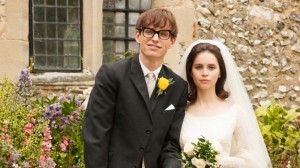By Muhammad Muzammal
COLUMNIST
Ravishing and lush, “The Theory of Everything” is a successful semi-biopic of the world famous physicist Stephen Hawkins, who defied his short life expectancy, due to ALS, and made forward strides in the world of physics with his theories of time and space.
However, a largely overlooked facet of his life, which is what the film was inspired by, is his 25-year marriage with Jane Wilde, a bond of true love whose endurance was tested when Hawkins was diagnosed with ALS and Wilde had to care of him and their children.
Unlike many films of this genre, “The Theory of Everything” doesn’t completely live in the sappy, melodramatic landscape, but thrives more with its sly humor and honesty.
The movie begins with Hawkins’s early life as a college student, pre-ALS. When he and Wilde lock eyes at a party one night, like the ripple effect, this one look changes their whole lives – an important point the film drives home with its wonderful final montage.
Hawkins and Wilde begin dating as Hawkins develops his groundbreaking thesis on time, which draws much acclaim from his college professors (one of whom is played by David Thewalis, in a subtle yet meaningful way). However, Hawkins begins to lose control of his body and has to use crutches to walk as the ALS relentlessly spreads in his system.
In a moving, poignant sequence, we see Hawkins and Wilde get married, have children and go through everyday life as a couple, a challenge onlu made harder by Hawkins’s degenerative nerve disease.
The relationship is stretched to its limits. Jane, a strong, intelligent woman who could hold her own, has to play nurse to her husband with a crippling disability, all the while raising four children. On the other hand, Hawkins sees Wilde as a lonely, exhausted wife, a painful truth recognized when he tells Jane he would understand if she was with another man.
These relationship dilemmas and the agonizing, underlying issues that lie beneath, make “The Theory of Everything” unflinchingly honorable in how it shows the film’s central marriage. Unlike a typical Hollywood romance, James Marsh’s film looks at its principal characters as people and not as robots. Although the mood is overly sentimental at times, the film stays grounded and real.
It is made real by its performances which are among the best of the year for an actor and actress. Felicia Hardy plays Wilde, as a vulnerable, tired woman who needs to be strong for her husband, a refreshing female-male role reversal, unaccustomed to mainstream Hollywood. Hardy’s range of emotions going from desperation to loneliness add a necessary, important dynamic to her character.
Eddie Redmayne, along with “Birdman’s” Michael Keaton, gives the best male performance of the year. Like a young Daniel Day-Lewis in Jim Sheridan’s ‘89 classic “My Left Foot,” Redmayne doesn’t overplay the role of a crippled genius and, instead, embraces the nuances like the small, crackling smile or the origami-like body movement that make Stephen Hawkins who he is. The actor carries the whimsical playfulness and the pain that Hawkins possessed, in his eyes, which stutter with each word his voice machine translates.
“The Theory of Everything” is not a great movie, however it is a wonderful exercise in its love story/biopic hybrid genre, but it ultimately feels compelling with a degree of schmaltz and softness. The movie unwisely tries hard to move us and doesn’t hold back. It’s controlled by the material, and not the other way around.
But the film makes us feel what it wants us to. It motivates us by showing the amazing life of a man who achieved so much, both as a person and as a scientist. By the end of “The Theory of Everything,” we are left knowing Stephen Hawkins not as the physicist, but Stephen Hawkins as the husband, father and most importantly, the individual.



